-
Red Flag (Alex Karpovsky 2012)
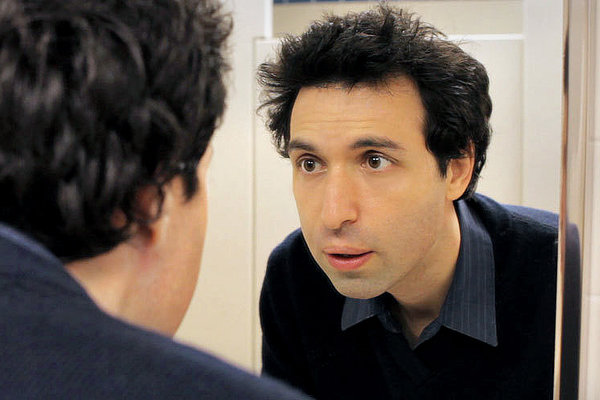
Red Flag (Alex Karpovsky 2012)
The idea of going on a trip with someone who's far from being the first person invited reminds one of Michael Winterbottom's Steve Coogan vehicle The Trip, a really funny movie -- which this isn't. According to Steve Seitz in the New York Times when the two showed at Lincoln Center early this year, Red Flag, a low-keyed, depressed autobiographical film by and about the actor Alex Karpovsky, "may be baggy and solipsistic" but "goes down more easily" than Rubberneck, a more fictionalized effort that was paired with it at the Elinor Bunin Theater. Karpovsky would be nowhere, Seitz says, without Lena Durham, who cast him as the barman in her big hit HBO show "Girls." Here, he gets kicked out by his girlfriend and has to go alone on a film tour in the south for something about woodpeckers (an actual film of his) being saved from extinction. Red Flag may be an actual cri de coeur from Karpovsky, who's seen as mildly suicidal here, but it's hard to see any new age mumblecore Woody Allen in Red Flag as some suggest. This is miles and miles from Woody Allen, and not even good mumblecore. As Seitz wrote, Karpovsky needs to stick with Lena Durham and only she can really save him, for the moment, from extinction. But he was in Andrew Bujalski's Beeswax and Lena Dunham's Tiny Furniture has a part in the Coen brother's new film, which did very well at Cannes, Inside Llewyn Davis. Maybe his "acclaimed" debut film, The Hole Story, maybe even Woodpecker, are really better than Red Flag,, even if Rubberneck isn't. Maybe if he's not Woody Allen, which he certainly isn't, he's a downbeat Jewish Steve Coogan (if there could be such a thing). Actually he's neither, but I am glad to be aware of him, just in case. Online critic Jordan Hoffman wrote a realistic rundown on this and two other Karpovsky short features. I suppose Hoffman is right in saying that Karpovsky's features feel like "glorified shorts." Hence it does fit with the SFJFF shorts.
Length: 85 mins.
SFJFF show times:
July 27, 7:15, Castro Theatre, San Francisco
August 11, 8:45, Grand Lake Theatre, Oakland
Last edited by Chris Knipp; 01-02-2015 at 07:45 PM.
-
That Woman (Ed Dick 2012)
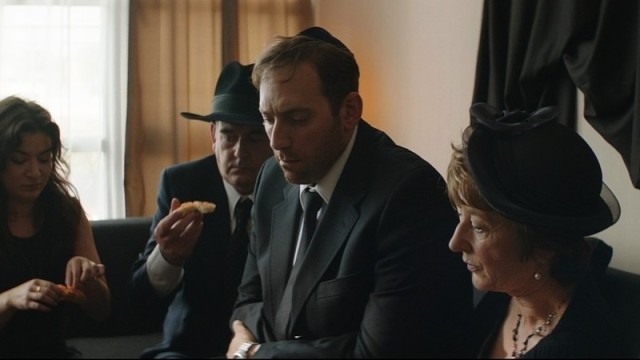
That Woman (Ed Dick 2012)
This is an odd one, with an arresting beginning, and a neat, finely structured trajectory. Witty, English, set in Northwest London, Jewish. "When I lost my girlfriend, I sat shiva for a week. Not for her, you understand. Kate wasn't even Jewish, let alone dead. I sat shiva for our relationship. I wanted to give it a proper sendoff. . ." This is a droll beginning, and it's well presented. This begins with a frontal look at Danny's anguished face. The family humor Danny and sit with him. "If it'll help him get over it quicker, where's the harm?" The payoff, that to get the bereaved Danny out to playing the field again his mum sets him up in a blind date with Monica Lowinsky, that woman, may seem more than a bit too high concept. Then he runs into Kate again. He's not really in a dating mood these days, he says; he's not sure the time is quite right. Maybe it's not right for Monica either. Very well written (by Amy Rosnthal), acted (by the whole cast, especially Ben Caplan as Danny) and edited (by Justin Krish). But one is more impressed than moved.
Well shot too though. The cinematographer, Sam Care, is a BFI "Brits to Watch" selection and has won awards. He has shot a great many shorts, and also some features. Sam Care's feature, In Our Name, directed by Brian Walsh, is critically acclaimed. You may watch some of his music videos here and watch the intro to That Woman here.
Length: 13 mins.
Reviewed as part of the 2013 San Francisco Jewish Film Festival.
Last edited by Chris Knipp; 01-02-2015 at 07:47 PM.
-
Two documentaries: Gideon's Army, The Trials of Muhammad Ali

Gideon's Army (Dawn Porter 2012)
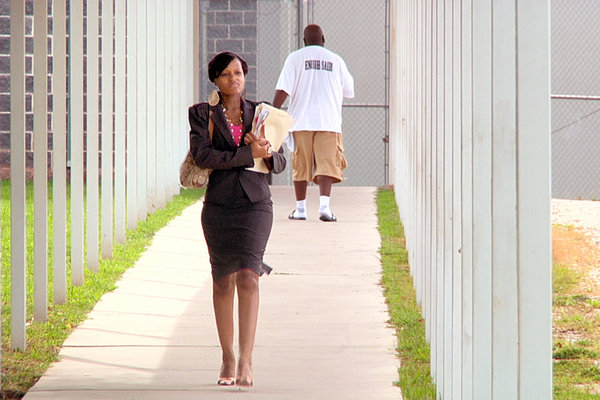
BRANDY ALEXANDER ON THE JOB
Soldiers for justice in the American South
The Gideon in the title of this Sundance award winning documentary refers to a landmark US Supreme Court decision, defendant Clarence Earl Gideon, who was arrested in 1961 for stealing soda and a few dollars from a pool hall in Panama City, Fla. His case was appealed to the Supreme court, which led to guaranteeing all defendants in criminal trials legal counsel whether or not they can afford it. The "army" are the roughly 15,000 US public defenders who now handle most of the 12 million criminal cases a year.The film focuses on three pubic defenders in the American South, Travis Williams and Brandy Alexander in Georgia and June Hardwick in Mississippi, as they struggle with lack of adequate funds and exhausting work loads defending a hundred clients at a time. Many of those clients are improperly charged and are pressured to enter a plea due to a lack of funds in the public defender's office to carry out a full exculpatory investigation. The minimum sentence for armed robbery is ten years, with a possibility of life. Even a charge and imprisonment can ruin a life. In one case a woman who's a certified mechanic has her possessions stripped while she is held before trial. Alexander did gain release for her, but she could not return to work. These three dedicated young lawyers love their work, but they barely have enough to live on; are paying off big student loans; have little time for recreation or for dating or family life. The film shows that June Hardwick leaves strict public defender work to earn enough to support her young son. This film can be hard to watch when it comes to seeing the obstacles and the outcomes the defendants are looking at, which make Les Miserables look quite up to date, and digging into the oppression of race and class these individual cases reveal, but it also inspires with the idealism of its three public defender subjects. The scenes are intense, the dialogue is to the point, and a final trial sequence is exciting. The filmmaking is simple, direct, and no-nonsense, the message powerful. No voiceover narration and none needed.
This debut by Dawn Porter us sure to be one of the most significant American documentaries of the year.
Gideon's Army, 95 mins., debuted at Sundance Jan. 2013, also shown at Ashland, Montclair, Nantucket; was shown in the San Francisco International Film Festival in April and then again will be screened as part of the San Francisco Jewish Film Festival, where it will be be screened at the Grand Lake Theater in Oakland Sat., Aug. 10, 2013 at 3:55 pm. It opened theatrically in NYC June 28, 2013 at Quad Cinema. It is rated a 95 on Metacritic on the basis of four reviews and it obviously impresses. HBO release July 1, 2013.
The Trials of Muhammad Ali (Bill Siegel 2013)
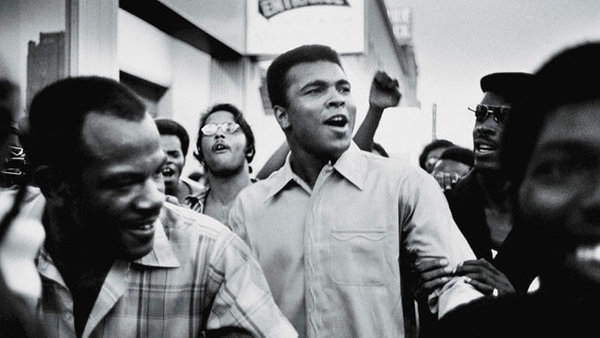
Muhammad Ali's moral commitments
Another good and powerful documentary film. This one focused on the defining moment for Muhammad Ali when on June 20, 1967 he was convicted of evading the United States draft by refusing to take part in the Vietnam Conflict. 46 years later, the political and cultural impact of that landmark court case comes to life in Bill Siegel’s The Trials of Muhammad Ali. Dave Zirin, the politically aware sports editor of The Nation, has called this "the best Muhammad Ali doc I've ever seen." That may be an exaggeration; there are some good ones, and this is not the finest celebration of the spirit and personality of the man. But The Trials of Muhammad Ali is film that focuses effectively on Ali's career in terms of his religious and political development, which led to his act of moral independence in refusing to serve in the white man's war against people of color in Vietnam, and before that, the way his taking the name Muhammad Ali instead of Cassius Clay he became an international figure. William C. Rhoden recently wrote an article in the New York Times about this moment in Ali's life as "a reminder that courage, honor and integrity are timeless." There are many Muhammad Ali docs, but this is still one worth seeing, and then some. It goes into considerable detail about Ali's fight to develop political awareness and to assume his new name and to be respected; the various opposing forces in the Nation of Islam and Sixties Black radicalism he had to contend with; the legal battle up to the Supreme Court over his conscientious objector status: these are all aspects of the life Siegel explores in more detail as essential to the complexity and status of Ali. Interesting to see a number of interviews with people not so much heard from before, including a Nation of Islam recruiter in Florida where Ali was training; the Rev. Louis Farrakhan; and Ali's second wife Khalilah Comancho Ali, formerly known as Belinda Boyd. To hear Khalilah Ali tell it, she was a major early influence on Ali's taking firm stands as a Muslim, and stood by him during his most difficult time of rejection and financial loss after his draft refusal. Produced by Kartemquin Films, this debuted at Tribeca in April, later was at AFI and Seattle as well as the SFJFF. Cinetic Media is to be the distributor. Viewed in a rough cut.
Length: 93 mins.
Last edited by Chris Knipp; 06-06-2016 at 09:02 AM.
-
Kenny Holtz: Kenny's Triumph of the Will: Children of Abraham (2011)
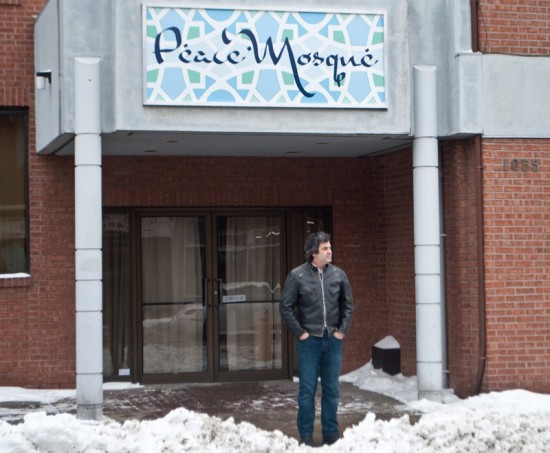
Kenny Holtz: Kenny's Triumph of the Will: Children of Abraham (2011)
This self-narrated "documentary," is Episode 3 - Children of Abraham" from the eponymous 2011 Canadian TV series, is like the films of Mads Brügger (of Red Chapel and The Ambassador), but more jokey and less risky, but still remarkable if it's true. The filmmaker, Kenny Hotz, sets himself a task which requires assuming an identity, or here, simply a stance, and convincing a bunch of people of something that might get him into trouble. He tells people he is sick of Jews and Muslims being hostile to each other, and he wants to be the first Jew to provide Muslims with a mosque. In the course of time covered in the film, he does that. But as with Mads Brügger only more so, the question arises: is this real? Hotz finds a property in Chinatown, actually a former Chinese funeral parlor (the city is not identified, but the film is Canadian, and it's probably Toronto) that has a nice layout for a mosque. He finds an imam, he raises funds from Jewish sources, or tries to (he is often turned down), he approaches some Muslim sources, like the Afghan consul, and he goes ahead and turns the space into a mosque. It all seems pretty iffy, but at least he has an artist friend do a really nice sign for the front and calls it "Peace Mosque." Then Muslim worshipers are found, and with Kenny initially on hand, a prayer service and sermon are conducted. But are these real worshipers? Who knows. Some of the humor, as when Kenny talks about not having space for the usual shawarma stands in the mosque, is in dubious taste. More than that, it risks offending muslims. Maybe if Kenny succeeds, he offends everybody. This seems a dubious venture. But the mosque looks convincing. I guess it really happened, and the question is, what happens to the mosque now? Kenny doesn't want it. And when you think about it, this was a very bold and ambitious project that challenged conventional social and cultural assumptions a lot. Like most comics, Kenny Holtz seems a bit crazy and only a slightly crazy person could do a thing like this. In an interview for the online publication Vice, Kenny says (his math a bit off: it's more like 69 years ago): "Would anyone really consider it? I paint a place, hang a sign, and people come to pray in it. Everyone else keeps killing each other. Fifty years ago if you told some Jew in Auschwitz, "Hey, 50 years from now you're going to be in Israel and your number one trading partners are going to be the Germans," the guy would shit himself. Anything can happen, anything can change."
Length: 22 mins.
Last edited by Chris Knipp; 01-02-2015 at 07:55 PM.
-
Ziyad Doueri: THE ATTACK (2012)-Centerpiece Film
Ziyad Douari: THE ATTACK (2012)
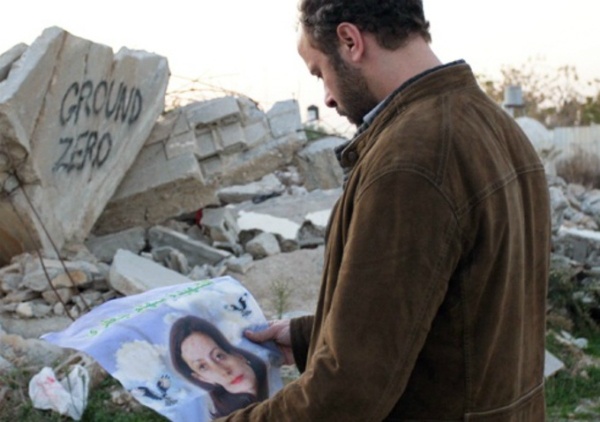
ALI SULIMAN IN THE ATTACK
Irreconcilable differences
Ziyad Doueri's The Attack provides an obvious setup. When Amin Jaafari, a distinguished Palestinian surgeon in Tel Aviv, gets a major Israeli award, there is a terrorist bombing and his wife, killed in the incident, becomes the prime suspect. This is a complete shock to him.
We get the point: even a thoroughly assimilated Palestinian awarded a national honor by Israeli society still finds his security and sense of belonging hang by a thread. The doctor, after treating the injured, is himself a suspect and is held for brutal interrogation but later found innocent and released. His colleagues at the hospital nonetheless pass around a petition to strip him of his Israeli citizenship. But a few Israeli colleagues remain utterly loyal. Incredulous and now angry at his wife whom he seems no longer to know or understand, Dr. Jaafari goes to Nablus to investigate, at considerable personal risk, the sources of the bombing, starting with his own and his wife's family.
This is a setup to show Palestinian rage and the impossibility of a Palestinian's assimilating into Israeli society. But it's not a very obvious setup, after all, because this can't be a very typical case. Surely Palestinians who've won distinction in Tel Aviv don't turn out to have wives who are suicide bombers -- or do they? The point, anyhow, seems indisputable: that no amount of success in Israel can shield a Palestinian from the suffering and anger of his people or their violent manifestations. And if Doueri stretches his plotline to make this point, maybe he is entitled to do so -- at least given the fact that the atmosphere and language feel authentic, particularly during the scenes set in Palestinian towns. The film is adapted from a novel by Yasmina Khadra. In his review of the film Peter Debruge of Variety says it "strips the source of nearly all its profundity."
The film turns into a kind of police procedural, but one where the investigator is not a cop but a collateral victim. There are no big revelations. In fact The Attack presents a situation more than it tells a story. This is both its weakness and its strength. Like Antonioni's L'Avventura, about a disappeared person who is hunted for in vain, leading to a puzzlement so rich it was deemed "a new cinematic language," The Attack mostly just points to dead ends. But the desired effect is to leave the audience in a state of profound discomfort. Insofar as it achieves this The Attack is a success.
Ali Suliman, who plays the lead role of Doctor Jaafari, is qualified by his background, an actor of Palestinian origin bilingual in Hebrew and Arabic and educated in Tel Aviv, and he gives a committed performance. His previous credits include Paradise Now, The Kingdom and Lemon Tree. And he's busy: he has had seven credits since The Attack. Doueri is a Lebanese who has worked more than once as a cameraman for Quentin Tarantino. His directorial debut was with the (1998) Beirut West, a lively, vernacular account of growing up during the Lebanese civil war of 1975. His second feature was less successful, an adaptation of Lila Says, a sexy French novel set in Marseilles. The Attack works well enough in bringing out the basics of its difficult subject matter, but Doueri's transition to seriousness and political relevance isn't totally successful. Though this effort is relevant and well-intentioned, without the director's previous humor and sexiness, without much individual style, his filmmaking becomes a little bit stiff and generic, and Debruge thinks the filmt feels "overlong and undernourished." But Manohla Dargis of the NY Times has the opposite view, seeing this film as superior to its source book: "In contrast to the novel, which habitually slips into polemicism and is bookended by a shock that dilutes its punch, Mr. Doueiri creates characters, emotional colors and political contradictions that have the agonized sting and breathe of life." In any case, the film has the solid polemical value, for some a provocation, of taking a neutral stance neither pro nor con Israel, yet acknowledging the inevitability of Palestinian rage.
If viewers don't get the message that that rage is just around the corner even in a high ranking Palestinian surgeon's house, that's part of an ongoing problem. But it is certainly a serious misinterpretation to say as one reviewer, Mike D'Angelo of AV Club, does, that this film "skirts perilously close to being an apologia for suicide bombing," though his being able to say this may be a sign of how the film has lost its source novel's complexity. Anyhow, the film's value is precisely that it is not an apologia for anything. The film works insofar as it unfolds from the developing point of view of Dr. Jaafari -- his understanding changing as he reviews memories we see as flashbacks. He never really understands or sympathizes with suicide bombings. To learn that it's not so hard for a Palestinian to become a suicide bomber is not the same as advocating one's doing so. Dr. Jaafari realies he's powerless when he finds pictures of his wife, whose action he despises, spread all over the Palestinian territories celebrating her as a patriotic heroine and martyr. He tears these posters down, but his effort is useless; they're everywhere.
The Attack/ الصدمة debuted at Telluride, then Toronto in Sept. 2012, with limited US theatrical release 21 June 2013. Screened for this review at Angelika Film Center, NYC. Scheduled as the Centerpiece Film of the San Francisco Jewish Film Festival, July 30 (Castro Theater, San Francisco) and Aug. 4 (California Theater, Berkeley).
Last edited by Chris Knipp; 01-02-2015 at 08:07 PM.
-
Jill Soloway: AFTERNOON DELIGHT
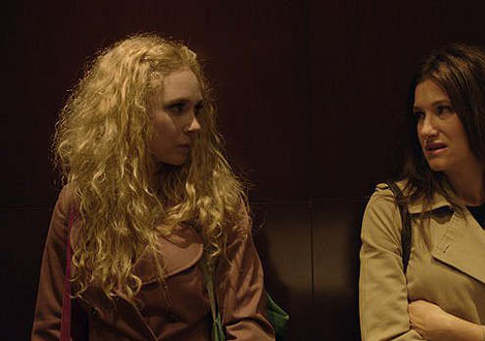
JUNO TEMPLE AND KATHRYN HAHN IN AFTERNOON DELIGHT
Jill Soloway: Afternoon Delight (2012)
Not-quite-dolce far niente
"How dare any of us? Rachel, do I need to remind you how much time you spend giving back?" queries Rachel's complacent, stylishly bespectacled lady shrink Lenore (Jane Lynch, droll), after the too-idle Rahcel's dissed her own complaining given the woes of the women of Darfur. It's a signal moment in this somewhat lazy and self-indulgent study of a well-off suburban LA matron who hasn't enough to do, besides preschool auctions, lackluster sex, and a kaput career, and fills the void by the very unwise choice of trying to save a stripper. Soloway, who has worked much in TV, writes specific, sometimes funny dialogue (for the women in the film anyway), but has an uncertain sense of tone here, wavering from the naturalistic to the comical to, at the last minute, some serious drama. Mostly this is a sit-com with touches of vérité; it promises something more, but due both to undue absorption in its clued-in social delineations and lack of a strong plotline, it never delivers. Soloway's observant specificity ultimately comes across as chattering trivia. Come to think of it, that describes a lot of American TV. But not all TV, anyway, since in this case Soloway has managed to make a film full of contemporary mom talk whose explicit sex would be uncomfortable or distasteful for most moms.
The chatty, people-pleasing, annoyingly motor-mouthed Rachel is played by Kathryn Hahn (of Parks and Recreation, Crossing Jordan). Her husband Jeff (Josh Radnor, fine) is apps-rich; they have a small boy, Mason (Noah Kaye Bentley). Rachel is active aat the Jewish Community Center -- perhaps she's a repressed or hideously deformed version of an old-fashioned Jewish mother -- till all this happens: to liven up their sex life, or just out of desperate boredom on Rachel's part, Rachel and Jeff and another couple go to a strip club, where Rachel gets a private session from confident little blonde "sex worker" (as she later styles herself) 19-year-old (she says) McKenna (Juno Temple, convincing). After this even the still desperately bored Rachel starts stalking McKenna across from the strip club, meets up and chats with her a couple of times -- and when she finds her deprived of her car and a place to live, takes her home, later even takes her in as a nanny for her kid. Jeff disapproves, but perhaps likes having McKenna to ogle. Rachel decides to "save" McKenna (get this) by providing her with a blog, to "tell her story." All this, lo and behold, does revive Jeff and Rachel's sex life. But then sex invades their and Rachel's girlfriends' and fellow moms' lives via McKenna more than they'd planned for. Yet eventually Soloway settles for the unlikely fantasy that seriously messing up can renew a marriage and even a life.
This is the kind of little movie that may have enough to make it distinctive but not quite enough to make it memorable. It isn't a surprise that the secondary female characters are drawn more distinctly than the male ones. But this remains a women's picture that women won't much want to watch; Hahn is surprisingly annoying for a protagonist, by the way. Audience-focus problems.
Afternoon Delight, 99 mins., debuted at Sundance 2013, was also shown at the SFIFF. Reviewed as part of the San Francisco Jewish Film Festival. Limited US theatrical release 27 August 2013.
Last edited by Chris Knipp; 01-02-2015 at 08:09 PM.
-
Hilla Medalia: DANCING IN JAFFA (2013)
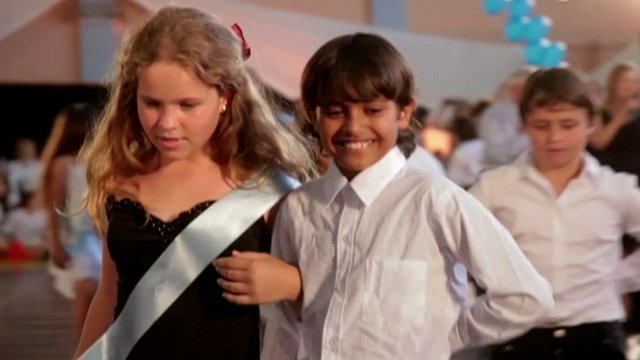
LOIS AND ALAA
Hilla Medalia: Dancing in Jaffa (2013)
Bringing together "enemies" in dance
Hilla Medalia is an award-winning 36-year-old Israeli documentary filmmaker whose 2007 To Die in Jerusalem brought together in dialogue (by satellite) the mothers of two teenage girls paired on a Newsweek cover, a Palestinian suicide bomber and an Israeli girl killed by her bomb. Her new film is about a less grim effort by famous ballroom teacher Pierre Dulaine to bring Jewish and Palestinian kids together on the dance floor, and we see some little friendships and personalities bloom in his modest "peace process."
Jaffa, once a Palestinian town, is now a poor, mixed suburb of Tel Aviv. The intense 2009 joint Israeli- Arab feature film Ajami focused on a rough part of Jaffa. In Dancing in Jaffa, Hilla Medalia follows Pierre Dulaine as he goes back to Jaffa, where he was born in 1944, son of an Irish father and Palestinian mother. (In the film he never mentions that his mother was also half French, which explains "Pierre.") He has not been back since his family was driven out when he was a child. He comes to introduce to Palestinian-Israeli, Jewish-Israeli, and mixed schools in Jaffa his Dancing Classrooms, a social development program for fifth-graders that uses ballroom dancing "as a vehicle to change the lives of the children and their families" (Wikipedia). This time the primary "change" is the somewhat radical one of pairing Jewish and Arab girls and boys as dance partners.
In teaching gawky eleven-year-olds to dance, the pixieish Dulaine emphasizes etiquette, dignity, and respect from the get-go. He has to give up on one school because they boys won't dance. The more extreme muslim males won't touch girls, or at first refuse. Things don't go that well at first, and for a while Pierre brings over from the States his (dancing, not life) partner of 35 years, Yvonne Marceau. Their dancing together for the kids inspires them: you can see the boys' eyes light up; they are charmed.
Medalia follows several of the kids more closely, notably Noor, a plump, dark Palestinian girl whose grief over the death of her father makes her sullen, depressed, and sometimes violent. Alaa is a small boy who lives in a shack with his poor fisherman father. Alaa, dark and all smiles, and Lois, a curly-haired Jewish girl fathered out of a sperm bank, become partners for the upcoming dance contest, and their jaunt on Alaa's father's little rowboat heralds a budding friendship. But the real miracle is Noor, who shows rhythm and grace from the start, and whose selection for the competition is part of a reawakening and new happiness that you can't help being a little amazed by. Ah, fifth graders: this is the age when kids are most open and malleable.
The film shows other things, like Dulaine approaching his family's original residence and beating a hasty retreat when the current occupants are not just unfriendly but apparently downright hostile. Dulaine mostly speaks English, but he also speaks Arabic to the kids who understand Arabic. For Hebrew, he has an interpreter or the teachers translate for him. The schools he visits are Israeli-Palestinian, Israeli-Jewish, and mixed Palestinian-Jewish. There are seven different dances in the lessons and final contest, though merengue and rumba seem to predominate. At the final contest, all the parents are as excited as you'd expect. Each dance couple pairs a Palestinian and a Jew. And nobody seems to mind. At least for the moment, Dulaine has achieved reconciliation and crossed barriers that earlier seemed uncrossable.
All this will be vaguely familiar, because you've probably seen a couple of other movies Pierre Dulaine inspired, the 2006 musical drama Take the Lead, starring Antonio Banderas as Dulaine, and Mad Hot Ballroom, a heartwarming and popular 2005 documentary about New York fifth graders who learn dance and take part in a dance contest. However, Dancing in Jaffa prefers not to mention these, and alludes only vaguely to Pierre Dulaine's fame as a ballroom dancer when he partnered with Yvonne Marceau at Jacob's Pillow, on Broadway, and in London, or his having been on the faculties of the School of American Ballet, Alvin Ailey American Dance Theater, and the Juilliard School. This movie isn't about that. It's about little Jewish and Palestinian Israeli kids being polite and friendly and wiggling their hips gracefully together. Dancing in Jaffa, a fairly simple and minimal film, isn't as priceless and cute or as proficiently made as Mad Hot Ballroom. But the gaps it bridges are, of course, more significant.
Dancing in Jaffa, 84 mins., in Arabic, English, and Hebrew with English subtitles debuted in NYC in January 2013, and was included in the Tribeca and Sydney festivals. It has been picked up by Sundance Selects. Screened for this review as part of the San Francisco Jewish Film Festival (July 26-Aug. 10, 2013). The film is set for limited US release April 11, 2014.
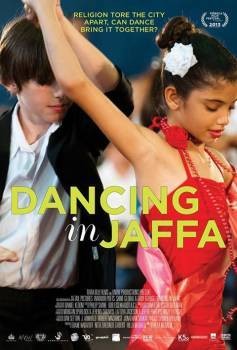
Last edited by Chris Knipp; 01-02-2015 at 08:11 PM.
 Posting Permissions
Posting Permissions
- You may not post new threads
- You may not post replies
- You may not post attachments
- You may not edit your posts
-
Forum Rules





 Reply With Quote
Reply With Quote









Bookmarks